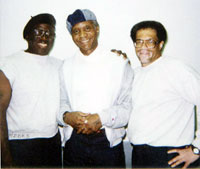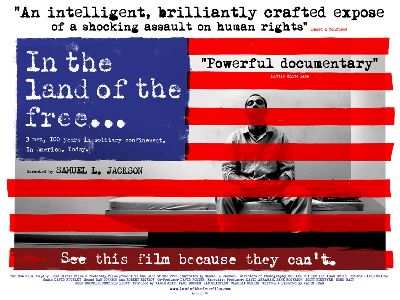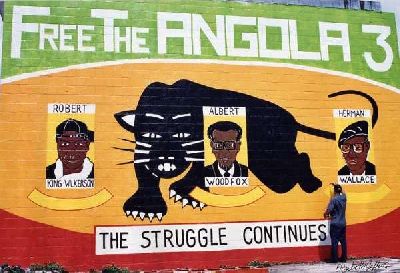Baltimore IMC : http://www.baltimoreimc.org
Review :: Civil & Human Rights : Crime & Police : Race and Ethnicity
The Case of the Angola 3 --A review of the new film “In The Land of the Free...”
Targeted for their militancy, co-captives Wallace, Woodfox and Robert King had organized a prison chapter of the Black Panther Party and they became known as the Angola 3 after they were falsely convicted by kangaroo courts and all-white juries. Wallace and Woodfox were convicted for the murder of prison guard, Brent Miller in 1972, and King was convicted separately for the death of another inmate in 1973.

Photo of the Angola 3: left to right, Herman Wallace, Robert King, and Albert Woodfox.
The Case of the Angola 3
--A review of the new film “In The Land of the Free...”
Produced by Vadim Jean, in memory of Anita Roddick
Film review written by Kiilu Nyasha
“They will never be able to break me,” said Herman Wallace, despite the torment and torture of 37 years in a 6 x 9 cell in the “bloodiest prison in the nation.” He and his comrade, Albert Woodfox, suffer such solitary confinement to this day.
Targeted for their militancy, co-captives Wallace, Woodfox and Robert King had organized a prison chapter of the Black Panther Party and they became known as the Angola 3 after they were falsely convicted by kangaroo courts and all-white juries. Wallace and Woodfox were convicted for the murder of prison guard, Brent Miller in 1972, and King was convicted separately for the death of another inmate in 1973.
Brent Miller’s widow, Teenie Miller, who appears in the film, asks, “Who really killed my husband?” At a 2008 hearing she said, “If they did not do this – and I believe that they didn’t – they have been living a nightmare for 36 years!”
This movie gives us a rare look at Angola prison, built on 18,000 acres in Louisiana that was a plantation where slaves, mostly from Angola, Africa, worked the cotton fields. It pictures the ugly daily existence of the plantation’s 5,000 captives -- more prisoners per capita than any other prison in the world – forced to work 17 hours a day for 2 cents an hour in fields of corn, cotton and sugar cane at gun point. A modern-day slave plantation.
This is the story of three Black Panthers who made a difference in the prison and in the lives of their fellow inmates, stopped the systematic rapes and brutalities against “fresh fish” by guards and inmates; organized and raised the consciousness of other prisoners for which they were railroaded and isolated.
At a very young age, Albert Woodfox robbed a truck and drove it to New Orleans where he was arrested. He escaped and went to Harlem where he found the New York Panthers and joined the Party. He was recaptured and wound up in Angola. Footage of the New York chapter and other Panther events are pictured, as well as testimony from activist, Malik Rahim, another Panther from New Orleans who grew up with Robert King and helped him win release in 2001, after 31 years of incarceration.
“I may be free of Angola, but Angola will never be free of me.” So said King upon leaving prison as he vowed to fight for the freedom of his comrade brothers.
King’s story and that of Wallace and Woodfox provide viewers with a stark look at today’s prison realities, as well as the widespread suffering of families and friends involved.
Much of the narration is done by Samuel Jackson, with commentary from Congressmen, Cedric Richmond and John Conyers, who visited Wallace and Woodfox, and the lawyers, Scott Fleming and Nick Trenticosta who took up the case.
This is a remarkable film, very enlightening, and should raise the consciousness of those who have no idea. It exposes mind boggling criminality and corruption, as well as overt, ongoing racism within the system. A must see.
--Kiilu Nyasha is a San Francisco-based journalist and former member of the Black Panther Party. Through the end of 2009, Kiilu hosted a weekly TV program, "Freedom Is A Constant Struggle," on SF Live, and many of her shows are archived here:
kiilunyasha.blogspot.com/
Kiilu also writes for several publications, including the SF Bay View Newspaper and BlackCommentator.com. Also an accomplished radio programmer, she has worked for KPFA (Berkeley), SF Liberation Radio, Free Radio Berkeley, and KPOO in SF.
--A review of the new film “In The Land of the Free...”
Produced by Vadim Jean, in memory of Anita Roddick
Film review written by Kiilu Nyasha
“They will never be able to break me,” said Herman Wallace, despite the torment and torture of 37 years in a 6 x 9 cell in the “bloodiest prison in the nation.” He and his comrade, Albert Woodfox, suffer such solitary confinement to this day.
Targeted for their militancy, co-captives Wallace, Woodfox and Robert King had organized a prison chapter of the Black Panther Party and they became known as the Angola 3 after they were falsely convicted by kangaroo courts and all-white juries. Wallace and Woodfox were convicted for the murder of prison guard, Brent Miller in 1972, and King was convicted separately for the death of another inmate in 1973.
Brent Miller’s widow, Teenie Miller, who appears in the film, asks, “Who really killed my husband?” At a 2008 hearing she said, “If they did not do this – and I believe that they didn’t – they have been living a nightmare for 36 years!”
This movie gives us a rare look at Angola prison, built on 18,000 acres in Louisiana that was a plantation where slaves, mostly from Angola, Africa, worked the cotton fields. It pictures the ugly daily existence of the plantation’s 5,000 captives -- more prisoners per capita than any other prison in the world – forced to work 17 hours a day for 2 cents an hour in fields of corn, cotton and sugar cane at gun point. A modern-day slave plantation.
This is the story of three Black Panthers who made a difference in the prison and in the lives of their fellow inmates, stopped the systematic rapes and brutalities against “fresh fish” by guards and inmates; organized and raised the consciousness of other prisoners for which they were railroaded and isolated.
At a very young age, Albert Woodfox robbed a truck and drove it to New Orleans where he was arrested. He escaped and went to Harlem where he found the New York Panthers and joined the Party. He was recaptured and wound up in Angola. Footage of the New York chapter and other Panther events are pictured, as well as testimony from activist, Malik Rahim, another Panther from New Orleans who grew up with Robert King and helped him win release in 2001, after 31 years of incarceration.
“I may be free of Angola, but Angola will never be free of me.” So said King upon leaving prison as he vowed to fight for the freedom of his comrade brothers.
King’s story and that of Wallace and Woodfox provide viewers with a stark look at today’s prison realities, as well as the widespread suffering of families and friends involved.
Much of the narration is done by Samuel Jackson, with commentary from Congressmen, Cedric Richmond and John Conyers, who visited Wallace and Woodfox, and the lawyers, Scott Fleming and Nick Trenticosta who took up the case.
This is a remarkable film, very enlightening, and should raise the consciousness of those who have no idea. It exposes mind boggling criminality and corruption, as well as overt, ongoing racism within the system. A must see.
--Kiilu Nyasha is a San Francisco-based journalist and former member of the Black Panther Party. Through the end of 2009, Kiilu hosted a weekly TV program, "Freedom Is A Constant Struggle," on SF Live, and many of her shows are archived here:
kiilunyasha.blogspot.com/
Kiilu also writes for several publications, including the SF Bay View Newspaper and BlackCommentator.com. Also an accomplished radio programmer, she has worked for KPFA (Berkeley), SF Liberation Radio, Free Radio Berkeley, and KPOO in SF.
Views
Information
Search
This site made manifest by dadaIMC software



